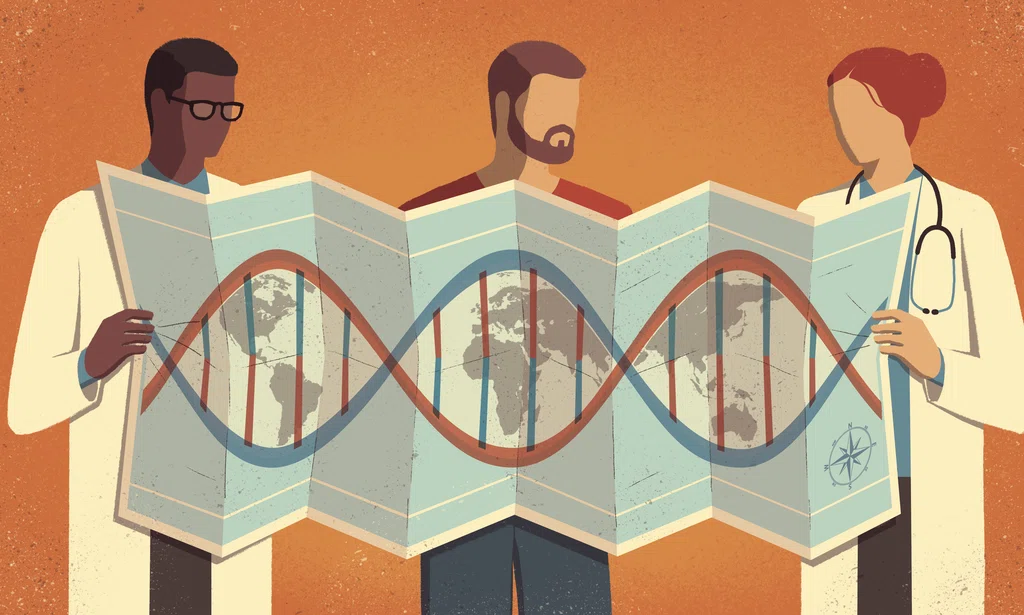

WATCH: HOW CANCER ON A CHIP
PLATFORM WORKS
DR. GORDANA VUNJAK-NOVAKOVIC’S
INNOVATIVE APPROACH TO MODELING CANCER
THE BIG PICTURE
New research initiatives take aim at cancer from all angles

Genome Integrity
Jean Gautier, PhD, Professor of Genetics and Development (in the Institute for Cancer Genetics); Co-leader, HICCC Cancer Genomics and Epigenomics Program
The Genome Integrity Initiative at Columbia investigates genome integrity, maintenance and instability to advance our understanding of cancer and develop or improve innovative therapies. Employing cutting-edge technologies and methods like single-cell sequencing, high-throughput chromosome rearrangement mapping, genome-wide CRISPR screens, live-cell and high-resolution imaging, this initiative uncovers the intricate mechanisms underlying genetic damage and mutations, shedding light on how these factors contribute to cancer development and progression. This pioneering effort holds the potential to unveil novel targets and innovative combination therapies for cancer treatments and pave the way for more highly targeted and personalized cancer therapies.
RNA Biology and Cancer Therapeutics
Laura Landweber, PhD, Professor of Biochemistry and Molecular Biophysics; Professor of Biological Sciences (in Systems Biology)
Hashim Al-Hashimi, PhD, Roy and Diana Vagelos Professor of Biochemistry and Molecular Biophysics
RNA Biology and Cancer Therapeutics has come center stage in recent years, including the celebrated success of mRNA vaccines in leading the fight against RNA viruses, such as coronavirus. RNAs are not only successful therapeutics, but with the vast ‘real estate’ of coding and non-coding RNAs, they are also gaining ground as potential new drug targets. This initiative combines basic biochemistry with cancer biology and personalized medicine, leading to new routes to target RNAs associated with diseases, such as cancer.
Genome Integrity
Jean Gautier, PhD, Professor of Genetics and Development (in the Institute for Cancer Genetics); Co-leader, HICCC Cancer Genomics and Epigenomics Program
The Genome Integrity Initiative at Columbia investigates genome integrity, maintenance and instability to advance our understanding of cancer and develop or improve innovative therapies. Employing cutting-edge technologies and methods like single-cell sequencing, high-throughput chromosome rearrangement mapping, genome-wide CRISPR screens, live-cell and high-resolution imaging, this initiative uncovers the intricate mechanisms underlying genetic damage and mutations, shedding light on how these factors contribute to cancer development and progression. This pioneering effort holds the potential to unveil novel targets and innovative combination therapies for cancer treatments and pave the way for more highly targeted and personalized cancer therapies.
“Our miniaturized, personalized approach to studying cancer, one patient at a time, could reduce the current trial-and-error approach to treatment, through better understanding of how a normal cell turns into a cancer cell, and why some people respond to treatments while others do not.”
Gordana Vunjak-Novakovic, PhD
University Professor, Mikati Foundation
Professor of Biomedical Engineering and Medicine, and
Professor of Dental Medicine at Columbia University
Cancer Computational and Experimental Protein Structure
Brent Stockwell, PhD, William R. Kenan Jr. Professor of Biological Sciences, of Chemistry, and of Pathology and Cell Biology; Chair, Department of Biological Sciences; Member, HICCC Precision Oncology and Systems Biology Program
Mohammed AlQuraishi, PhD, Assistant Professor of Systems Biology (in Computer Science); Member, HICCC Cancer Genomics and Epigenomics Program, Assistant Professor of Systems Biology (in Computer Science)
Is merging AI with protein biochemistry the answer to cancer? This initiative represents a groundbreaking approach in cancer research, harnessing the power of advanced machine-learning algorithms to unravel the intricate three-dimensional structures of proteins, and their interactions with drugs. Proteins play a pivotal role in cellular functions and changes in their shapes can lead to cancer. This cutting-edge initiative employs state-of-the-art technologies to predict protein shapes, how they changes in cancer, and how they affect therapeutic drugs, offering new avenues for the development of innovative cancer therapies.
RNA Biology and Cancer Therapeutics
Laura Landweber, PhD, Professor of Biochemistry and Molecular Biophysics; Professor of Biological Sciences (in Systems Biology)
Hashim Al-Hashimi, PhD, Roy and Diana Vagelos Professor of Biochemistry and Molecular Biophysics
RNA biology has come center stage in recent years, including the celebrated success of mRNA vaccines in leading the fight against RNA viruses, such as coronavirus. RNAs are not only successful therapeutics, but with the vast ‘real estate’ of coding and non-coding RNAs, they are also gaining ground as potential new drug targets. This initiative combines basic biochemistry with cancer biology and personalized medicine, leading to new routes to target RNAs associated with diseases, such as cancer.
IRVING CANCER DRUG DISCOVERY PROGRAM
Tannishtha Reya, PhD, Herbert and Florence Irving Professor of Physiology and Cellular Biophysics; Member, HICCC Tumor Biology and Microenvironment Program
The Irving Cancer Drug Discovery Program (ICDDP) was founded to help faculty make the leap from lab to clinic with their discoveries and accelerate the development of new approaches for the diagnosis and treatment of cancer. This incubator program provides faculty with critical support and infrastructure to drive innovation, including counsel with key industry leaders, funding for new technologies, and resources and training for every step of the drug development process.
Human Tissue Immunity and Immunotherapy
Donna Farber, PhD, George H. Humphreys II Professor of Surgical Sciences (in Surgery); Professor of Microbiology and Immunology; Member, HICCC Tumor Biology and Microenvironment Program
Ben Izar, MD, PhD, Vivian and Seymour Milstein Family Assistant Professor of Medicine; Assistant Professor in Systems Biology; Member, HICCC Tumor Biology and Microenvironment Program
The Human Tissue Immunity and Immunotherapy Initiative (HTI3) brings together experts and cutting-edge technologies, including biobanking, single-cell and spatial genomics, proteomics, biomedical and protein engineering, and computational analytics to understand the nuanced mechanisms that underlie the immune system's response to tumors. By meticulously dissecting the molecular interactions within the tumor microenvironment, this initiative aims to shed light on how the immune system and cancer interact. Such insights will not only help answer current clinical challenges, like why some patients respond to immunotherapy and others do not, but will also lead to new personalized and targeted therapies that harness the full potential of the patient's immune system.
CANCER COMPUTATIONAL AND EXPERIMENTAL PROTEIN STRUCTURE
Brent Stockwell, PhD, William R. Kenan Jr. Professor of Biological Sciences, of Chemistry, and of Pathology and Cell Biology; Chair, Department of Biological Sciences; Member, HICCC Precision Oncology and Systems Biology Program
Mohammed AlQuraishi, PhD, Assistant Professor of Systems Biology (in Computer Science); Member, HICCC Cancer Genomics and Epigenomics Program, Assistant Professor of Systems Biology (in Computer Science)
Is merging AI with protein biochemistry the answer to cancer? This initiative represents a groundbreaking approach in cancer research, harnessing the power of advanced machine-learning algorithms to unravel the intricate three-dimensional structures of proteins, and their interactions with drugs. Proteins play a pivotal role in cellular functions and changes in their shapes can lead to cancer. This cutting-edge initiative employs state-of-the-art technologies to predict protein shapes, how they changes in cancer, and how they affect therapeutic drugs, offering new avenues for the development of innovative cancer therapies.
CANCER DATA SCIENCE
Karthik Natarajan, PhD, Assistant Professor of Biomedical Informatics
Todd Rosenblat, MD, Associate Professor of Medicine; Member, HICCC Tumor Biology and Microenvironment Program
Imagine if we weren’t limited by the questions we could ask in our research. How might that accelerate our ability to find not only the best ways to treat cancer, but the best ways to treat each patient’s individual cancer? The Cancer Data Science initiative at the HICCC will build critical infrastructure to harness the power of the vast amounts of data being produced every day in our labs and clinics, using artificial intelligence to be able to answer limitless questions about cancer research and care.
Cancer Data Science
Karthik Natarajan, PhD, Assistant Professor of Biomedical Informatics
Todd Rosenblat, MD, Associate Professor of Medicine; Member, HICCC Tumor Biology and Microenvironment Program
Imagine if we weren’t limited by the questions we could ask in our research. How might that accelerate our ability to find not only the best ways to treat cancer, but the best ways to treat each patient’s individual cancer? The Cancer Data Science initiative at the HICCC will build critical infrastructure to harness the power of the vast amounts of data being produced every day in our labs and clinics, using artificial intelligence to be able to answer limitless questions about cancer research and care.
HUMAN TISSUE IMMUNITY AND IMMUNOTHERAPY
Donna Farber, PhD, George H. Humphreys II Professor of Surgical Sciences (in Surgery); Professor of Microbiology and Immunology; Member, HICCC Tumor Biology and Microenvironment Program
Ben Izar, MD, PhD, Vivian and Seymour Milstein Family Assistant Professor of Medicine; Assistant Professor in Systems Biology; Member, HICCC Tumor Biology and Microenvironment Program
The Human Tissue Immunity and Immunotherapy Initiative (HTI3) brings together experts and cutting-edge technologies, including biobanking, single-cell and spatial genomics, proteomics, biomedical and protein engineering, and computational analytics to understand the nuanced mechanisms that underlie the immune system's response to tumors. By meticulously dissecting the molecular interactions within the tumor microenvironment, this initiative aims to shed light on how the immune system and cancer interact. Such insights will not only help answer current clinical challenges, like why some patients respond to immunotherapy and others do not, but will also lead to new personalized and targeted therapies that harness the full potential of the patient's immune system.
Irving Cancer Drug Discovery Program
Tannishtha Reya, PhD, Herbert and Florence Irving Professor of Physiology and Cellular Biophysics; Member, HICCC Tumor Biology and Microenvironment Program
The Irving Cancer Drug Discovery Program (ICDDP) was founded to help faculty make the leap from lab to clinic with their discoveries and accelerate the development of new approaches for the diagnosis and treatment of cancer. This incubator program provides faculty with critical support and infrastructure to drive innovation, including counsel with key industry leaders, funding for new technologies, and resources and training for every step of the drug development process.



